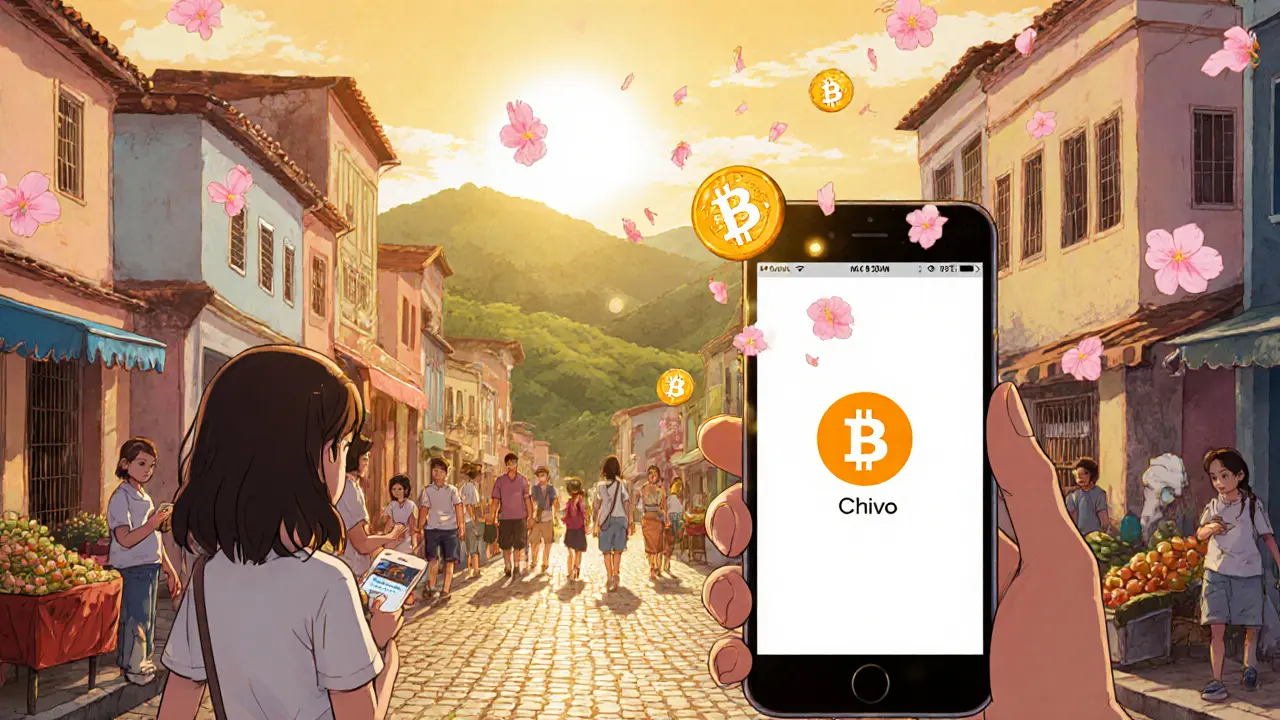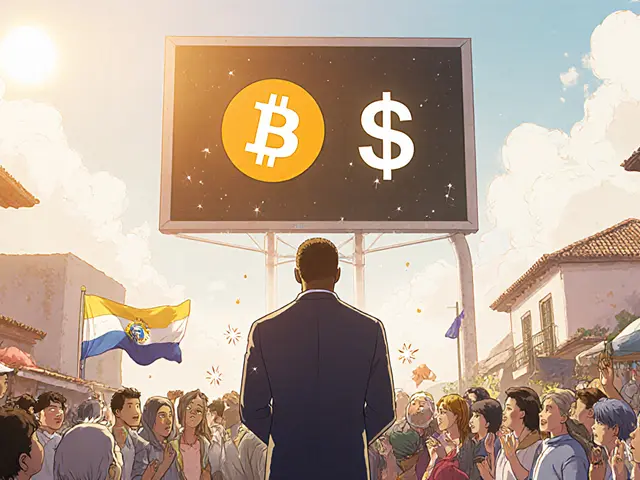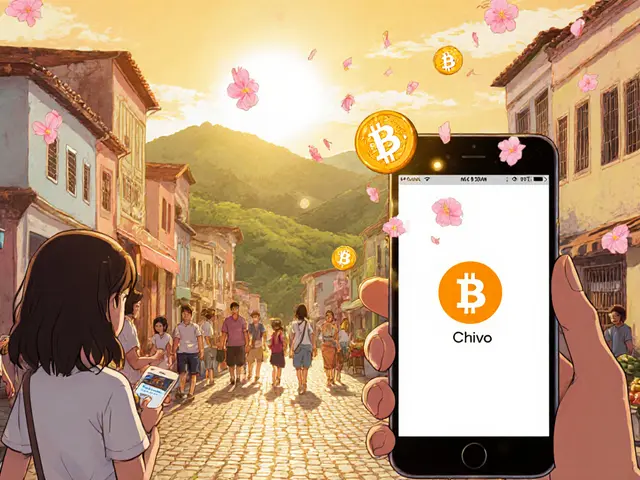Chivo Wallet Comparison Tool
Compare Wallet Options
See how the Chivo wallet stacks up against traditional remittance services and private crypto wallets.
| Feature | Chivo Wallet | Traditional Services | Private Crypto Wallets |
|---|---|---|---|
| Supported Currencies | BTC & USD | USD only | Multiple (BTC, ETH, etc.) |
| Transaction Fee | 0% (Bitcoin) | 5-10% | 0-2% (varies) |
| Government Backing | Yes (until Jan 2025) | No | No |
| Legal Tender Status | Yes (2021-2025) | No | No |
| Regulatory Oversight | CNAD & LEAD | Financial Regulators | FinCEN, etc. |
Chivo Wallet Benefits Calculator
Estimate potential savings using Chivo compared to traditional remittance services.
Estimated Savings
Using Chivo instead of traditional services saves approximately per transaction.
User Adoption Insights
Learn about real-world user experiences with Chivo.
- Migrant workers saved up to $15 per transaction
- High download rate (46% of population)
- Zero fees for Bitcoin transfers
- Low sustained usage (80% never used Bitcoin)
- Technical glitches and downtime
- Account lockouts during outages
When ElSalvador announced it would accept Bitcoin as legal tender in 2021, the world wondered how everyday people could actually use the new national currency. The answer was the Chivo wallet, a government‑backed mobile app that lets anyone send and receive both Bitcoin and US dollars without fees.
What the Chivo wallet actually is
The Chivo wallet is the official digital wallet launched by the Government of ElSalvador on 7September2021, the same day the country became the first to adopt Bitcoin as legal tender. Developed by AlphaPoint, a fintech firm with nine years of experience building crypto exchange infrastructure, the app supports two currencies: Bitcoin (BTC) and the US dollar (USD). Users receive a $30 credit to jump‑start their balance, and every Bitcoin transfer incurs zero commission fees.
Why the government pushed a national crypto wallet
ElSalvador relies heavily on remittances - money sent home by Salvadorans abroad - which makes up roughly 20% of the nation’s GDP. Traditional services such as Western Union or MoneyGram often charge 5‑10% per transaction. By using Bitcoin’s borderless network, Chivo promised to shave those costs to almost nothing, theoretically boosting household income and financial inclusion for the 70% of Salvadorans without bank accounts.
Technical specs and early adoption numbers
At launch the app was marketed as a “dual‑currency” solution. Its architecture was built to handle millions of concurrent users, a claim tested when about 46% of the country’s population downloaded the app within the first weeks. However, the rapid scale also exposed bugs: occasional shutdowns, identity‑theft reports, and connectivity issues in rural areas where smartphone penetration is uneven.
How Chivo compares to other options
| Feature | Chivo wallet | Western Union / MoneyGram | Coinbase / Binance |
|---|---|---|---|
| Supported currencies | BTC & USD | USD only | Multiple (BTC, ETH, etc.) |
| Transaction fee | 0% (Bitcoin) | 5‑10% | 0‑2% (varies) |
| Government backing | Yes (until Jan2025) | No | No |
| Legal tender status | Yes (2021‑2025) | No | No |
| Regulatory oversight | CNAD & LEAD | Financial regulators | FinCEN, etc. |

Regulatory backdrop and the IMF clash
The International Monetary Fund (IMF) played a decisive role in 2025. After a series of volatile Bitcoin price swings - the coin fell from $69,000 in 2021 to below $20,000 in 2022 - the IMF warned that ElSalvador’s fiscal stability was at risk. The agency tied a $1.4billion assistance package to the removal of Bitcoin’s legal‑tender status, which officially happened in January2025.
Legal framework: LEAD and CNAD
To give the experiment a legislative home, the government introduced the Digital Assets Issuance Act (LEAD) in 2023. LEAD created the National Commission of Digital Assets (CNAD), a regulator charged with overseeing all crypto‑related activities, from exchanges to wallet providers. Even after Bitcoin stopped being legal tender, these bodies continue to supervise private crypto businesses operating in the country.
User experience: hopes, hurdles, and lessons learned
Surveys in 2024 showed that eight out of ten Salvadorans never used Bitcoin through Chivo, despite the $30 incentive. Those who did benefit were typically migrant workers who sent money home; they saved up to $15 per transaction compared with traditional services. On the flip side, many users suffered losses when Bitcoin’s price plunged, and a handful reported being locked out of their accounts after the platform’s occasional outages.
Current status and future outlook
Even though Bitcoin is no longer a mandatory payment method, the government has not abandoned crypto altogether. In March2025 the Strategic Bitcoin Reserve Fund grew to 6,102 coins, worth about $500million, signalling continued belief in Bitcoin as a store of value. ElSalvador will also host the PLANB Forum2025, the region’s biggest crypto conference, and aims to attract fintech startups that can work within the LEAD‑CNAD framework.
Key takeaways
- Chivo was the world’s first government‑issued national crypto wallet, built by AlphaPoint and launched alongside Bitcoin’s legal‑tender status.
- Its zero‑fee Bitcoin transfers targeted the massive remittance market but were hampered by volatility and technical glitches.
- The IMF’s pressure led to the removal of Bitcoin as legal tender in early 2025, though the wallet’s infrastructure remains.
- LEAD and CNAD provide a regulatory skeleton that could support future private‑sector crypto projects.
- Real‑world user data shows high download rates but low sustained usage, highlighting the gap between policy ambition and everyday adoption.

Frequently Asked Questions
What is the Chivo wallet?
Chivo is a mobile app created by the ElSalvadoran government that lets users hold and transfer Bitcoin and US dollars without transaction fees. It was launched in September2021 alongside the country’s Bitcoin‑as‑legal‑tender law.
How did Chivo aim to improve remittances?
By using Bitcoin’s near‑instant, low‑cost network, Chivo intended to cut the 5‑10% fees charged by services like Western Union. Migrant workers could receive money in Bitcoin and convert it instantly to dollars, keeping more of their earnings.
Why did the IMF intervene?
The IMF warned that exposing the national economy to Bitcoin’s extreme price swings threatened fiscal stability. It made the removal of Bitcoin’s legal‑tender status a condition for a $1.4billion assistance package, which ElSalvador accepted in early 2025.
Is the Chivo app still usable?
Yes. Although Bitcoin is no longer mandatory for everyday transactions, the app still functions as a dual‑currency wallet for Bitcoin and dollars. Users can keep their funds, trade, or transfer them without fees.
What regulatory bodies now oversee crypto in ElSalvador?
The National Commission of Digital Assets (CNAD), created under the Digital Assets Issuance Act (LEAD), supervises all crypto‑related activities, from exchanges to wallet providers, ensuring compliance with AML/KYC requirements.








Write a comment
Your email address will be restricted to us